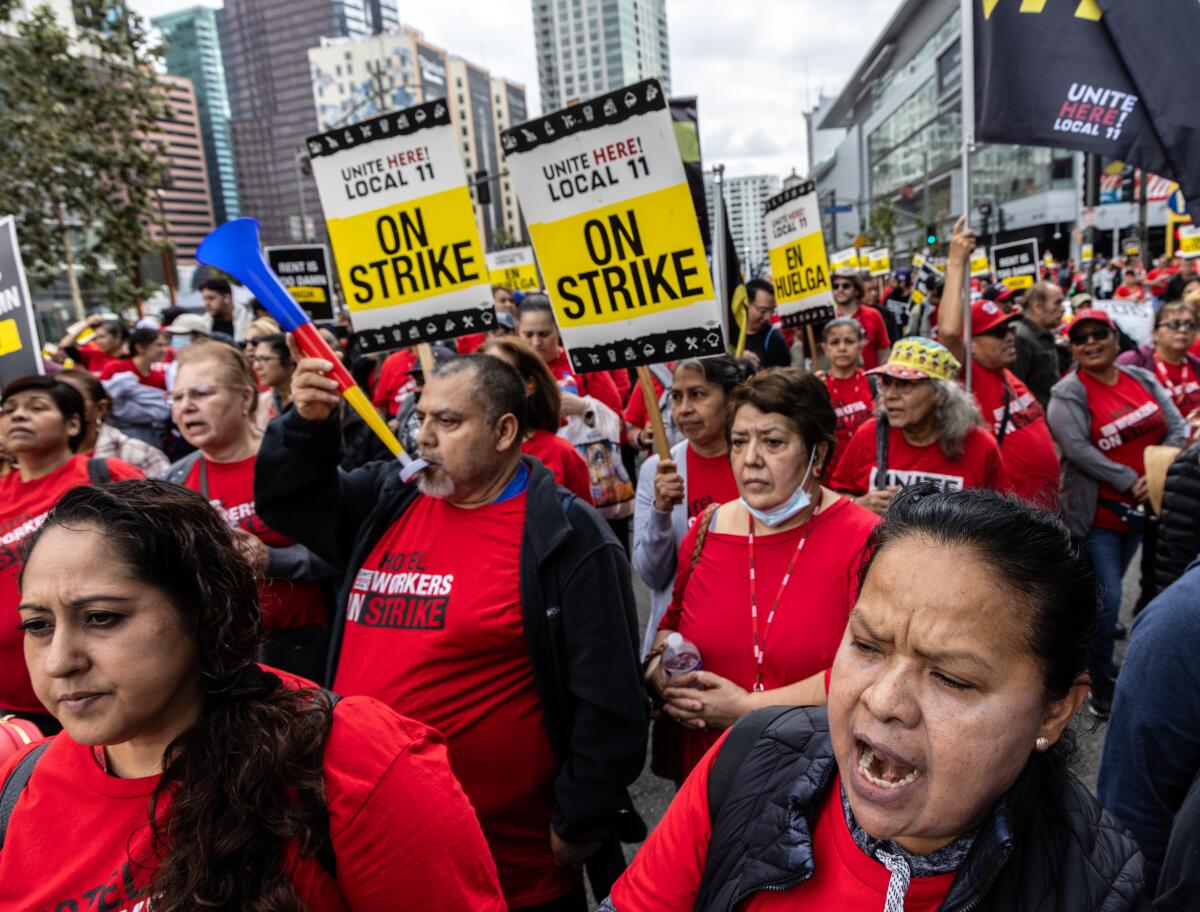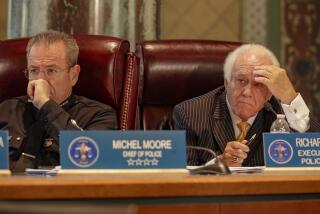Deal struck to remove homeless hotel housing measure from L.A.’s March ballot

Los Angeles City Council President Paul Krekorian has struck a deal with the politically powerful hotel workers’ union to remove a measure from the March election ballot that would have required hotels to participate in a city program to put homeless residents in vacant hotel rooms.
Under the agreement, the City Council would approve a new package of regulations on the development of new hotels, forcing such projects to go through a more extensive approval process. Hotel developers also would be required to replace any housing that is demolished to make way for their projects, by building new residential units or buying and renovating existing ones.
In exchange, the union’s proposal for placing homeless residents in vacant hotel rooms would be explicitly listed as voluntary, a move that would cause it to resemble Inside Safe, the program created by Mayor Karen Bass to combat homelessness. Hotel owners are willing participants in that program.
Unite Here Local 11, which represents 32,000 hospitality workers in Southern California and Arizona, praised the agreement, saying it would ensure that the city places a priority on the creation of housing, not luxury hotels. Many of Unite Here’s members have been unable to find decently priced homes near their jobs, forcing them to endure punishing commutes.
A controversial measure that would require hotels in Los Angeles to provide vacant rooms to homeless people will go before voters in 2024.
“We have said all along that our contract campaign has been about two things: housing for our members where they work and a living wage,” Kurt Petersen, the union’s co-president, said in a statement. “With this ordinance, we have done more to protect housing than any single contract demand would have done.”
The proposal has already received signatures from five other council members — Hugo Soto-Martínez, John Lee, Katy Yaroslavsky, Nithya Raman and Traci Park — putting it two votes shy of passage. Park, who serves on the council’s trade and tourism committee, said she believes the original measure would have had “catastrophic consequences” for tourism locally had it won voter approval, by mandating that hotels take in homeless residents without accompanying social services.
“The thought of putting individuals, many of whom have very serious mental health and substance abuse issues, [in hotel rooms] without on-site services is a recipe for disaster,” she said.
Wednesday’s deal comes as Unite Here enters its fifth month of rolling strike actions as its members fight for higher wages and better working conditions. So far, four hotels across Southern California have reached salary agreements with the union.
Unite Here also has been fighting a number of hotel projects that would result in the elimination of low-cost apartments, particularly those covered by the city’s rent stabilization law, which places a cap on yearly rent increases. Under the Krekorian proposal, the city would need to determine whether there is “sufficient market demand” for a new hotel project, while also identifying whether it would have an impact on demand for housing, childcare and other services.
Unite Here has become a major force in L.A. politics, putting hundreds of thousands of dollars into a campaign to last year elect Soto-Martínez, a former Unite Here organizer himself. The union is also skilled at gathering signatures for ballot measures in and around L.A.
Last year, Unite Here qualified a measure for the March ballot requiring the city’s Housing Department to create a new voucher program to serve the city’s unhoused population. Under that proposal, hotel managers would have been tasked with informing the city each day about the number of vacant rooms they had. Hotels also would have been required to accept temporary housing vouchers issued by the city under such a program.
Get the lowdown on L.A. politics
Sign up for our L.A. City Hall newsletter to get weekly insights, scoops and analysis.
You may occasionally receive promotional content from the Los Angeles Times.
The hotel industry responded by launching a publicity campaign against the measure, warning that it would put hotel workers in danger. The campaign repeatedly pointed to problems in the city’s Project Roomkey program, which placed homeless residents in hotels after the outbreak of COVID-19.
Project Roomkey, which is no longer in effect, generated a spate of internal City Hall reports about property damage, drug use and violence at hotels in downtown, Westlake and the San Fernando Valley.
Heather Rozman, president and chief executive of the Hotel Assn. of Los Angeles, said her organization is still studying the proposal but commended council members for being willing to “listen to all sides of the issue.”
Inside Safe, the program launched by Bass to combat homelessness, already uses dozens of hotels and motels as temporary housing. Bass, looking to scale back room rental costs, is also working to purchase hotel and motel properties for that program.
The proposed ordinance would also require that both hotels and hosts of short-term rentals on platforms such as Airbnb secure operating permits from the Los Angeles Police Department. Both Krekorian and the union said such a move would help neighborhoods fight back against short-term rental properties that have “nuisance” activities, such as drug sales or noisy parties.
“Irresponsible hotel and short-term rental operators cannot be allowed to endanger the public safety or impair the quality of life in our neighborhoods,” Krekorian said.
More to Read
Sign up for Essential California
The most important California stories and recommendations in your inbox every morning.
You may occasionally receive promotional content from the Los Angeles Times.












